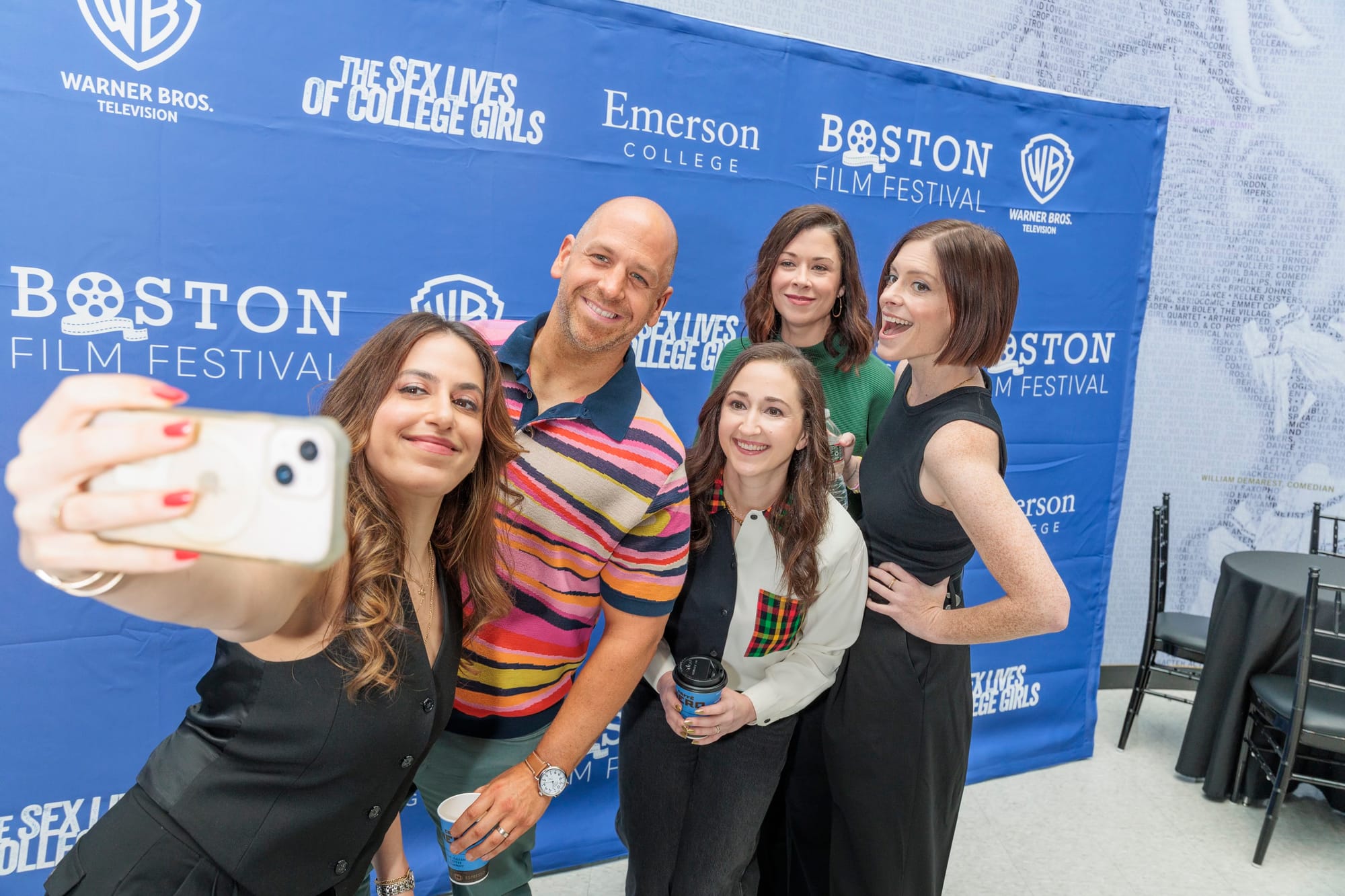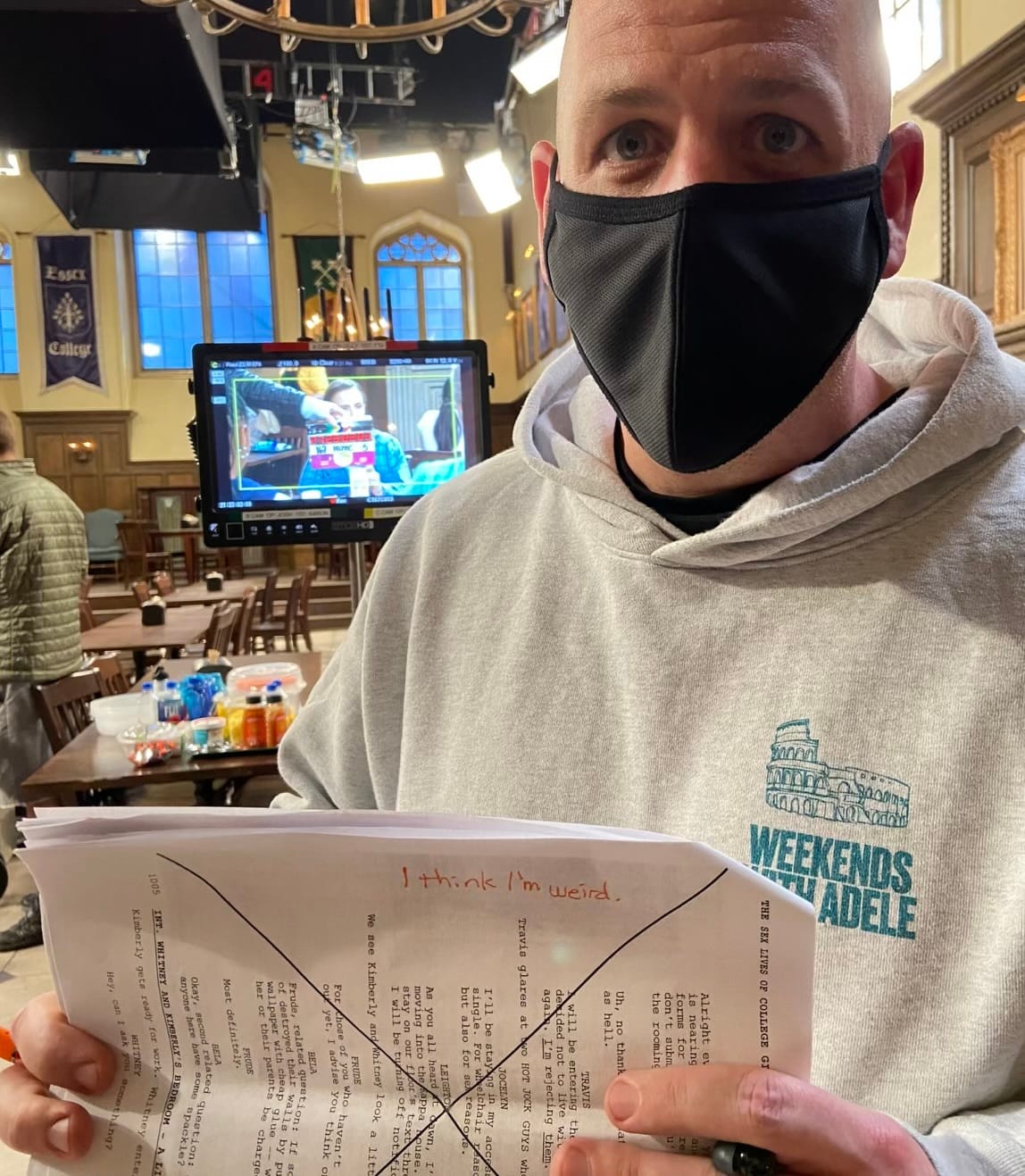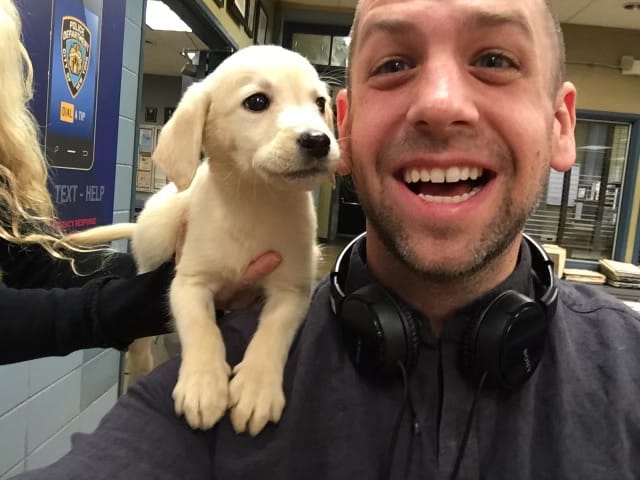Wands Spotlight: Justin Noble

Let's spend some time with Sir Justin Noble, co-creator and showrunner of Sex Lives Of College Girls, returning to Max on November 21. This show is hilarious and very fun. Here's the season 3 teaser!
Justin is one of my best friends in the entire world – you can read the story of how we fell in love and went on one spectacular date in my post about The Magician (it's a pretty funny story involving my mental illness). Justin is my funniest friend, I officiated his wedding, he passed out and almost killed a flower girl at my wedding, we've traveled all around the world together (at Epcot), and he's been my ride or die since we met over twenty years ago. He's also a super successful television writer, director, and producer, and here he is talking about his creative process. Enjoy!

How would you describe yourself? Do you use the word “artist”? Do you use another word?
I would not say artist. I literally laugh at the thought of me saying it. I think I subscribe to like a five-year-old’s basic definition of the word artist. Artists paint things, or sometimes, and only sometimes, draw with like one charcoal pencil. Everyone else? Not an artist. Maybe they’re a “musical artist” or a “voiceover artist” or a “real estate sales artist," but they need that qualifier. I would say I’m a writer. I think that’s the only label I would give myself directly. Otherwise I would use clunkier phrases like I “work in the arts” or “work in comedy” or “direct a little” or “produce TV” or “sound like an angel when I sing most songs, especially Disney prince songs, which are as we all know, are not common enough in their films” – but I wouldn’t say “artist” by itself. I think to me it’s about specificity, as opposed to any other reason. It’s not insecurity, or feeling like artists are soft people who wear berets. Although, let’s be real, they do.
[Note: Justin has an incredible voice, and he should one hundred percent do the voice for a Disney prince – Disney, get on this]
How do you know when it’s time to move out of the envisioning/brainstorming/inspiration gathering process and get to work?
This is admittedly not my strength. I labor over the early stages in most things. I think that’s sort of where the real work gets done, and I think many people sell that stage short. It’s all fine and good for someone to say “I’m just gonna start writing and then I’ll figure out what it is I’m saying” – but I feel like in the scripts I read where people say they did that, it shows. That approach requires a level of going back and finessing and fine-tuning that I think a lot of people can’t actually bring themselves to do once they finish a first draft. So few people are willing to re-break something they’ve written – they’ll make edits, but it’s rarely a full new skeleton. So I tend to build the skeleton really, really slowly before I do anything else. I’m not sure it’s for the best. I have a lot of empowering notes in my phone about working fast and laboring over the early stages less. I think being a kid who “played school” with his cousins as a child gave me an A-Student perfectionist mentality that doesn’t really translate to a creative career where there aren’t correct and incorrect answers. Basically, I move on once I’m bored with the stage I’m in – and I almost always stay there long enough to bore myself.
Are you a planner/outliner? Is your process more intuitive? How did you discover a process that worked for you? And have you ever worked differently?
I’m an extreme planner. And extremely tangible in my approach. I like to write words on note cards. Or scribble with a pen on a printed-out document. I think it stems from me finding comfort from feeling organized. Disorganization is not good for my brain. I won’t be able to focus until I feel like I’m settled and ready to focus. If there’s a mess, the task at hand is to clean the mess, not to think creatively. But a bunch of school-supplies, magnetized up on a white board, with little 90-degree angles? Now that’s a version of story-breaking that I like to look at. In terms of figuring out what works for me, I think for me it’s sort of a life-long game of trial and error – and then recreating moments and situations that have felt productive to me in the past. It makes me think that those situations are worth recreating because they are, for some reason for me, ideal for thinking creatively. I think at the gym while I bike. I think in the car, but only as I drive to Palm Springs. I work on airplanes. Etc.
If you’re working on a piece of art/writing, and you suddenly get a new idea, how do you deal with that interruption? And how do you determine whether that new idea belongs in this piece or a different one? If you’ve mapped out how something is supposed to be, do you ever divert from the plan?
I need to be in a bubble on an idea. I don’t juggle. If I have to work on two different projects at once, I have to separate them – maybe one in the morning, one at night. At the very least there is a long outdoor walk in-between switching those gears. A little sunshine sorbet. (Dear god I’m a wordsmith. Can I go back and change how I label myself? Hi, Justin, Wordsmith.)
Can you describe the worst part of your creative process? Which step do you enjoy the least?
I’ll say the not-cute, inside part out loud: I very rarely enjoy getting feedback. The vulnerability in that is a necessary part of what I do, but it’s my least favorite. I worry someone will mess up something that is working. Now, of course, that doesn’t mean that the direction I initially pick for something is always the “best” or “funniest” or anything like that. On the contrary, I feel I can regularly beat my old stuff when I re-work something after getting feedback. I’ll come up with something I like even more, a lot of the time. But the worst part is clicking send and thinking “oh god, what if I put all this work into it and they give this one note that will pull it apart!” The fear of the project leaving the safe little nest of my mind.
What is your favorite part of the creative process and why?
I loooove ideating. I love coming up with three sentences of something that would be interesting and funny. The rush of energy of feeling that something will be exciting and fun to work on – before it sets in that it’s just that: a lot of work ahead. And I’d be lying if I didn’t say that things being well received and appreciated isn’t a pretty favorite part too, when it happens. Once I met a guy in a bar who I didn’t know, but who saw me do a show at another college, and he told me that he and his friends still quote a sketch I did 10 years later. That stuck with me. And I don’t think it’s egotistical to feel proud of those wins. If anything, it’s actually reflective on the opposite end of the ego spectrum. Little wins that make you feel good and proud help to keep the inner critic and saboteur at bay.
How active is your inner critic in your process? How do you deal with your inner critic? Does he/she ever have anything helpful to say? Do you have any tips for how to silence them?
Lol, I mention my inner critic and then it’s the next words I see when I scroll. Of course. I actually really value and respect my inner critic. I don’t like them, but I’m glad they are there. I am one of those “let’s keep working, it can be better” people. And I’m proud to be that, and I wouldn’t want to be any other way. Call me crazy but if we care about something, we kinda should keep working hard at it to make it the best it can be. Otherwise what the hell are we doing. So I like that there is a voice in my head saying “Look it over one more time, are there any parts that can be better? What’s a backup to this joke, let’s just pitch on it for 10 minutes and see if we like anything better.” That being said, sometimes my inner critic takes it too far, and they win, and I shut down thinking I just don’t have it in that moment. And I’ve come to accept that that’s okay. But I try, as best I can, to push that voice away when it’s getting too loud, and instead try to pump myself up. There is an amazing quote about this in the Beyonce movie for Renaissance. I don’t have the quote in front of me, and there’s no way I could possibly look it up because I’m writing this answer in 1980 and I don’t have the internet yet, but she says something to the effect of “I’ve accomplished a lot that I can be proud of. I don’t have to worry anymore about how something will be received. I can just do something the way I would do it. That will be good enough.” Okay, so I’m sure that is nothing like her quote – but that is the version I wrote in my phone that I read at least several times a week.
Tell me a story of creative conflict, either internally or in a collaboration. How did you work through the conflict? Is creative friction or conflict something that you seek out in a creative process, or try to avoid?
Externally, with another person, I avoid conflict in the creative process at all costs. I work in comedy, and I firmly believe that good comedy only comes from people who are in good spirits as they make it. That’s why I’m basically a cruise director clown in my writers rooms. There is also never just one good way something can develop. If someone is adamantly bumping on an aspect of something I’m working on, even if I don’t understand why after talking about it – people sometimes people cannot articulate what’s not working for them – I step away and start trying to find a new path. The old path might still come back! They might come around to it after they see other options, and maybe decide those options aren’t as good. Or, maybe you’ll find something you both like better. But it’s just so not worth sticking your heels in and demanding you are right about something, at least to me. In my experience when people do that, it ends up feeling like the worst part of the thing they create and they end up being like “damn, I fought for that?!”
How do you deal with burnout?
Okay ten of wands, let’s do this. Just kidding, I’ve got nothing here. I burnout so hard. I don’t have a good fix for it. When I burn out, I burn out. It’s really hard for me. I get very negative. Like, scarily negative. I get lost in why I’m doing anything I’m doing. I think the best way to deal with true burnout is to stop it before it starts – because once it starts, I sort of just have to ride it out. Luckily I have an amazing husband and friends who are helpful at pulling me out of it, and reminding me that taking a break and doing something I find fun is constructive to rebuilding the best version of me – as opposed to seeing it as an additional time delay that I already can’t afford in a busy schedule.
What is your spiritual/psychological relationship to your work?
I’m not sure I have one! Is that weird?!
Do you enjoy collaboration or are you more of a solo artist? Is there a story you could tell me about how you came to understand this about yourself?
Okay, so in execution I do both, but in my heart and mind, I think I’m definitely a collaborator more than a solo artist. I never really spiral out when I have a creative buddy around. I think having an audience – and yes, I think a collaborator is a version of an audience as you are building something together – brings out the best in me. And I think it’s more fun for everyone involved. I think the system that works best for me is a heavy dose of collaboration, but then I have the ability to step away and work on things on my own, and bring them back to the other person.
What is your ideal creative environment?
It’s interesting. My knee jerk reaction to this question would be “a nice, empty hotel room or Air BNB where I’m super comfortable but alone and know I won’t have any distractions from other aspects of life.” But coming off the heels about whether I’m a solo artist or collaborator, I could also see myself saying “A room full of funny, high-energy people from all different walks of life who love having a good time making each other laugh.” I think I genuinely need both.
Can you tell me a story of a time that you got to say “I told you so” creatively? Where you stuck to your guns and turned out to be right?
Oh I definitely have tons of those, and I love them. Not sure what that says about me, lol. Off the top of my head, one example is that I once made a pilot and someone involved that was pretty powerful in the process told me there was one joke that should be cut in the edit before we deliver it. And I was like, um, that’s literally the best joke in the whole show. At the end of the day, I stayed strong. (By which I mean, I took enough of their notes elsewhere that I felt okay not taking this one that I felt strongly about.) This was back when they tested pilots with live audiences who literally hold little dials that they turn in one direction when they like something, and the other direction when they don’t. And just to explain the setting here, as this is happening, the creators and executives are all sitting in a little private lounge, watching in live-time as little dots on a screen move, showing how it is testing. We get to the moment where that joke is and... the dots SKYROCKETED. Literally to the tippy top of the screen, suggesting that almost every single person out of the 200+ in the room thought it was so funny that they turned their dial. I turned and shot them a look and pointed to the screen. They made a “you were right” face. Some people would probably read this anecdote and think “eh, you probably didn’t need to point it out to them” but the thing is... I do think you need to show people you have instincts worth trusting.
Have you ever stuck to your guns and turned out to be wrong? How did you handle that?
I mean, that pilot didn’t get ordered to series, so maybe the same example, lol. JK, I don’t honestly believe that, that pilot was great. Sure there are things I create or write or add that don’t turn out to be perfect, but I’ll say this: a way more common feeling I have is that I regret NOT changing something that I knew wasn’t great and I left it as is.
What is the bravest thing you’ve ever done creatively?
Put the vulnerable thoughts in my head in the mouths of characters and try not to cry at a table read when people don’t know it’s me.
What is your relationship to deadlines? Do you love them? Hate them? Why?
I loathe a deadline. A thing is ready when it’s ready. To arbitrarily decide “it must be ready by this date” is to accept that you might not make the best possible version of it. Deadlines only exist in the business side of things for logistical reasons, at least to me.
What is the best piece of creative advice you’ve ever gotten?
It’s not really advice per se, but my answer would be believing the nice things that people say. I used to think that people who think they are funny make themselves not funny. I believed this so hard that... I got the words "Not Funny" tattooed on my arm. In comedy, when someone says “You're so funny” we’re so conditioned to say “No, no, no, I’m not” or give some self-deprecating response. And that’s all fine, do whatever you want. But you can’t do it so much that you believe it. Nothing has made me better at making things funny or feeling funny than believing that I’m funny.
What is the best piece of creative advice you’ve given?
“You’ve got this.”
Have you ever had a creative failure? What did you learn from it?
At the risk of taking an academic approach to this question: are creative failures real? What makes a creative failure? Perhaps the real failure is feeling that something was a creative failure. I cannot imagine pointing at something and saying “Creative Failure, right there!” Some things “don’t work” – but creative failure feels like that inner saboteur talking! Creative pieces can’t “fail.”

